Maine Search Engine Optimization Services
As a business owner, your fundamental goal is to make sales and collect and keep revenues - not simply maximize website traffic. And a basic rule of getting sales and revenues is that you want to attract people who are ready, willing and able to buy - not "tire kickers".
Google gets its search results in front of a lot of consumers by being the world's #1 search engine. It has that position because it delivers the best answers to the questions that users ask most.
However, Google says that its mission is to “organize the world's information and make it universally accessible and useful” - not necessarily to help you sell stuff.
 FREE Guide:
FREE Guide:
Grow Your Business with Google: The Definitive Guide to Choosing the Best Google Search Agency for Your Business
My New FREE Guide explains in plain English how Google Ads and SEO work, why you need to work with a professional agency, and how to find the best Google Search agency by evaluating their Qualifications, Experience, Business Culture, Measurement & Reporting, Campaign Strategy & Management, and Pricing & Communication.
 Some of the queries made by Google users come from people who are trying to find a business from which they can buy what you're selling. But the majority come from people who are seeking something else altogether.
Some of the queries made by Google users come from people who are trying to find a business from which they can buy what you're selling. But the majority come from people who are seeking something else altogether.
What you and the Google Search Consultant have to do is make your pages show up near the top of search results on the queries that are relevant to your business, while not wasting server bandwidth on nonconverting traffic that makes your pages slow to load.
So you can appreciate the problem we're facing, here's a breakdown of the types and numbers of queries (as defined by Semrush) that Google users are making:
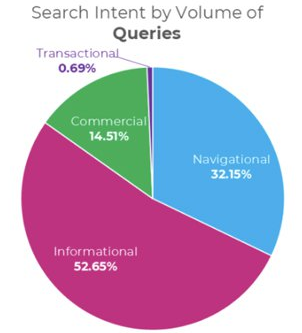
- Informational Queries, where the user's intent is to find the answer to a question or a specific piece of information, like “how to cook a chicken” account for 52.65% of all queries.
- Navigational Queries, where the user's intent is to find a specific brand, website or URL, like “Panasonic” account for 32.15% of all queries.
- Commercial Queries, where the user's intent is to research products or services before making a purchase decision, like “best US made pickup” account for 14.51% of all queries.
- Transactional Queries, where the user's intent is to find a source for a specific item which they intend to buy, like “where to buy tv in lincoln county” account for only 0.69% of all queries.
Because only about 15% of Google queries are made by people who are researching something they want to buy - or, better yet, seeking a company that sells it, SEO done the traditional way - competing for #1 rankings on popular keywords - could be bringing you 85% non-converting traffic from users who have no intent to buy.
And there are other reasons why “conventional” SEO doesn't produce sales:
- Optimizing a website or page for a single keyword phrase reduces traffic from other queries that could more easily be converted to sales.
- It's difficult to anticipate the words people might use in a query to search for what you're selling, because they may call your product or service by a name that's different from the name you use, or search on the name of a problem instead of on the name of your solution - like “countertop oven” vs “air fryer.”
- Web copy that draws lots of search-engine traffic by pleasing search engines isn't the persuasive, sales-oriented copy you need to convert users to paying customers.
- Google and other search engines are constantly changing their ranking algorithms, so you need to keep changing web copy to try to maintain rank - but good sales copy is perpetual.
On top of that, there's the issue of competition.
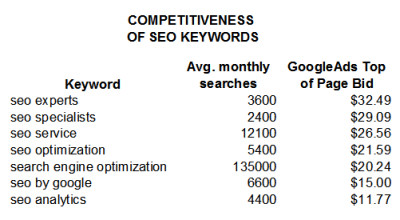 Cost of a Google Ads click is a good metric for competitiveness of keywords. In the table to the left, see how although "seo experts" and "seo analytics" both are getting around 4,000 searches a month, more competition on "seo experts" makes a click on that cost nearly 3X that of a click on "seo analytics". Reason for this is almost certainly that users looking for "seo experts" convert to SEO buyers at around 3X the rate of users looking for "seo analytics."
Cost of a Google Ads click is a good metric for competitiveness of keywords. In the table to the left, see how although "seo experts" and "seo analytics" both are getting around 4,000 searches a month, more competition on "seo experts" makes a click on that cost nearly 3X that of a click on "seo analytics". Reason for this is almost certainly that users looking for "seo experts" convert to SEO buyers at around 3X the rate of users looking for "seo analytics."
It's no coincidence that the keywords with the most competition are the ones that most strongly signal purchase intent.
And trying to optimize your website for a popular and potentially very valuable keyword on which you have no hope of appearing on Google page 1 is a waste of time and money.
Why Using the Right Keywords is Critical
 Using the right keywords will increase the return from your technology investment by getting more converting traffic, generating higher-quality leads, acquiring new customers, making more and bigger sales, and enhancing the legitimacy and reputation of your business. Go here for more information about keyword research.
Using the right keywords will increase the return from your technology investment by getting more converting traffic, generating higher-quality leads, acquiring new customers, making more and bigger sales, and enhancing the legitimacy and reputation of your business. Go here for more information about keyword research.
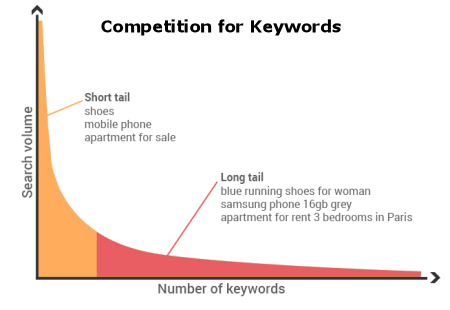 For businesses without unlimited advertising budgets - like mine, maybe yours - the key strategy is to attract queries that are (1) more specific to your business so have less competition and (2) signal purchase intent, so your traffic comes from people looking to buy what you're selling.
For businesses without unlimited advertising budgets - like mine, maybe yours - the key strategy is to attract queries that are (1) more specific to your business so have less competition and (2) signal purchase intent, so your traffic comes from people looking to buy what you're selling.
I can help you with that.
Using our proprietary SEO for Sales System SM we will work with you to create an SEO plan that best fits your business and advertising budget.
We'll discover the key user questions for which to optimize your web pages to answer in order to:
- Attract users with intent to purchase what you're selling
- Be competitive in your key markets
- Create persuasive propositions and web content that sell
- Deliver new customers and more sales at lower cost, by not attracting casually curious or no-budget users
- Minimize the negative effects of ranking algorithm changes by Google and other search engines
And we will use our business experience, engineering knowledge, 100% “white hat” advanced technical skills and all proven search engine optimization best practices to analyze, test, upgrade, and fine-tune your website to make it more easily spidered, indexed and comprehended by Google while also providing a better user experience. We will NOT use “black hat” techniques that could get your website penalized by Google.
More About Why I Should Be Doing Your SEO
- Most SEO companies and individual practitioners will make promises of unrealistically high rankings of your pages on very competitive keywords, using “insider knowledge” they claim to have about how Google works. Nobody outside Google has that knowledge. These people will take your money and run. Go here to find out why you should not buy SEO or Google Ads or any other Search Marketing service on price or because someone has promised to get you page one rankings in Google. Because cheap SEO has big hidden costs, and anyone guaranteeing Google Page One rankings is either a fool or a crook.
- I offer real-world, professional services at fair prices, with a Risk-Free 30-Day Trial and an Unconditional 100% Money-Back Guarantee. I do not, cannot - because no one can - guarantee Google Page One rankings, but rather to get to know you and your business and increase traffic and conversions on your website purely by “White Hat” techniques that comply with all of Google's policies and guidelines.
- Hiring your own staff to do SEO is expensive. Even if you're able to hire capable people - not necessarily a given - by bringing SEO in-house you immediately begin to incur training and overhead expenses.
- SEO is harder than it looks. Doing SEO well requires specialized knowledge, skills and tools. I have an engineering master's degree and am a certified Google advertising pro. I will bring to your firm - without requiring a long-term commitment or adding to your overhead - a rare combination of expertise and experience at both the technical and sales aspects of online marketing.
- SEO is always evolving. Just keeping up 100% with the effects of Google's ranking algorithm changes is a big job (I would know), and there are technical and regulatory changes constantly ongoing that impact SEO as well.
- SEO takes a lot of time. Your time is better - and more profitably - spent doing what you do best: running your business. Leave SEO to me.
- Measurement and reporting of results is a key part of SEO. I know what key performance indicators (KPIs) determine the impact of SEO on your business goals, and will report those to you regularly. (There's more to SEO KPIs that contribute to your bottom line than just impressions and clicks - see this article on the SEMRUSH blog about “12 KPIs to Track & Measure.”)
Why SEO?

The very most fundamental purpose of any business's website is to attract traffic that converts.
For organic search traffic - traffic that doesn't come from paid ads, and makes up 53% of all website traffic - SEO is what makes that happen.
And your pages need to be optimized for the search engine most used by your best potential customers. That's Google. Because 86% of all web browsing sessions worldwide begin with a Google search.
Optimizing your web pages for Google organic search takes work on two fronts:
- Technical SEO that makes pages crawlable and indexable for Google, while providing a good user experience for consumers, and
- Quality content that answers users' questions, generates leads, acquires customers and drives sales.
The technical component of SEO contributes to enhanced website performance and better user experience by making pages:
![]() Faster loading, easier to navigate and more usable, for better user experience
Faster loading, easier to navigate and more usable, for better user experience
![]() Mobile-friendly, because under Google's policy of mobile-first indexing, the version of a website's content seen by the smartphone Googlebot crawler is used for indexing.
Mobile-friendly, because under Google's policy of mobile-first indexing, the version of a website's content seen by the smartphone Googlebot crawler is used for indexing.
![]() More easily understood and more accurately indexed against queries by Google’s BERT, MUM and other algorithms
More easily understood and more accurately indexed against queries by Google’s BERT, MUM and other algorithms
![]() Unique as to content, to avoid competition among pages that results in subpar performance for all
Unique as to content, to avoid competition among pages that results in subpar performance for all
![]() Up to date, by redirecting the URLs of retired pages to current alternatives and avoiding 404 (Not Found) errors
Up to date, by redirecting the URLs of retired pages to current alternatives and avoiding 404 (Not Found) errors
![]() Safe for users, through use of TLS (Transport Layer Security) or SSL (Secure Socket Layer) - protocols for encrypting internet traffic and verifying server identity
Safe for users, through use of TLS (Transport Layer Security) or SSL (Secure Socket Layer) - protocols for encrypting internet traffic and verifying server identity
The business component of SEO contributes to enhanced website performance and better user experience by:
- Analyzing and evolving your marketing strategy
- Developing persuasive marketing and sales people-friendly-content
- Optimizing the ways in which your business interacts with customers online
When your website is enhanced for SEO, it will:
![]() Differentiate you from your competition - because if you're unable to do that, your business will fail.
Differentiate you from your competition - because if you're unable to do that, your business will fail.
![]() Create an emotional connection with your customers - because if you're unable to do that, your business will fail.
Create an emotional connection with your customers - because if you're unable to do that, your business will fail.
![]() Increase your return on advertising spend, since an SEO campaign involves no media buy, only our modest agency fee
Increase your return on advertising spend, since an SEO campaign involves no media buy, only our modest agency fee
![]() Produce more prequalified website traffic from people who are using Google organic search to look for products or services like yours
Produce more prequalified website traffic from people who are using Google organic search to look for products or services like yours
![]() Used in conjunction with Google Ads, increase the number of links to your website on a Google search return page, producing more website exposure to potential customers and enhancing the legitimacy of your brand
Used in conjunction with Google Ads, increase the number of links to your website on a Google search return page, producing more website exposure to potential customers and enhancing the legitimacy of your brand
![]() Reach your entire customer base with website pages optimized for each of your target demographics and for each level of your conversion funnel from introductory content to create awareness for new prospects to conversion-directed content for those ready to buy
Reach your entire customer base with website pages optimized for each of your target demographics and for each level of your conversion funnel from introductory content to create awareness for new prospects to conversion-directed content for those ready to buy
![]() Produce higher-quality leads with which you can begin to engage for future business
Produce higher-quality leads with which you can begin to engage for future business
![]() Convert lookers to buyers at a much greater rate and lower cost than outbound strategies like cold-calling or e-mail blasting
Convert lookers to buyers at a much greater rate and lower cost than outbound strategies like cold-calling or e-mail blasting
![]() Give you powerful insights and hard data about your target demographics
Give you powerful insights and hard data about your target demographics
![]() Keep prospects on your website longer, viewing more content, maximizing lead-gathering and selling opportunities
Keep prospects on your website longer, viewing more content, maximizing lead-gathering and selling opportunities
![]() Improve the experience users get from your website, getting you repeat visits
Improve the experience users get from your website, getting you repeat visits
![]() Create and increase awareness, authority and trust for your brand, through its enhanced visibility in search
Create and increase awareness, authority and trust for your brand, through its enhanced visibility in search
 SEO Audit: I will analyze your website and provide a comprehensive report with specific, actionable recommendations for website changes that will get more converting traffic, acquire new customers, generate higher-quality leads, make more and bigger sales, and enhance the legitimacy and reputation of your brand. Go here for more information about my SEO Audits.
SEO Audit: I will analyze your website and provide a comprehensive report with specific, actionable recommendations for website changes that will get more converting traffic, acquire new customers, generate higher-quality leads, make more and bigger sales, and enhance the legitimacy and reputation of your brand. Go here for more information about my SEO Audits.
An incomplete list of issues that technical SEO can fix includes:
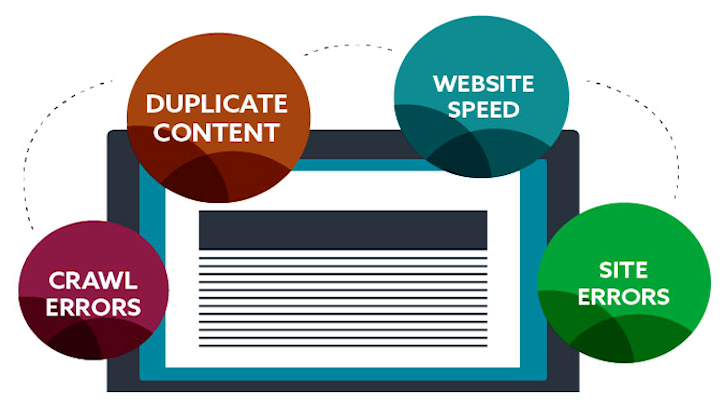
- Failed Google Cumulative Layout Shift and other Core Web Vitals assessments
- Broken links and 404 errors
- Excessive HTTP requests
- Uncompressed HTML
- HTML errors
- Slow-loading or broken image, audio and video files
- Duplicate content
- Unindexed pages
- Orphan pages
- Non-critical CSS and Javascript files that slow down page rendering
- Duplicate titles and meta description tags that cause competition between pages
- Unused stylesheet code that slows page loading
- Missing Google Analytics tracking code
- Missing or broken structured data markup
- White space and HTML comments that slow page loading
- Images that could delay loading until after critical resources have been rendered
- Static assets not cached
- Page titles and meta descriptions too long or too short
- Pages blocked by robots.txt file
- Use of Flash
- Mobile unfriendliness: non-responsive images, too-small text, clickable elements too close together
- No custom 404 error page
- Illusion of completeness leaving critical content unread
What does SEO cost?
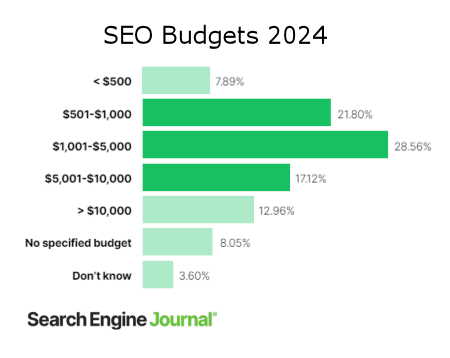 Results of a recent survey published by Search Engine Journal show the distribution of monthly 2024 SEO budgets (see the bar graph) as reported by a sample of businesses that were willing to provide this information. Budgets reported by B2B and B2C businesses were distributed similarly up to the level of $5000/month, with approximately 48% spending in this range for SEO. Approximately 38% of all businesses surveyed reported SEO spends of more than $5000/month.
Results of a recent survey published by Search Engine Journal show the distribution of monthly 2024 SEO budgets (see the bar graph) as reported by a sample of businesses that were willing to provide this information. Budgets reported by B2B and B2C businesses were distributed similarly up to the level of $5000/month, with approximately 48% spending in this range for SEO. Approximately 38% of all businesses surveyed reported SEO spends of more than $5000/month.
Another survey by digital marketing platform Semrush found that, on average, small businesses spend just under $500 monthly on SEO, but that those spending more than that are 53.3% more likely to be “extremely satisfied” with the results they're getting.
Yet another survey from digital marketing agency marketplace Credo found that most SEO providers charge by hourly rates, 85.5% charging between $50-$200 per hour, most in the $100-$200 range, with 60% having a monthly retainer minimum of over $1000.
 My prices are fair - your investment can be as little as $20 a day - and with a difference. I'm not going to charge you for time or effort. I'm going to charge you to use my specialized expertise to develop campaigns that will make money for you over time far beyond your initial investment. And I offer my SEO services as risk-free, prepaid 30-day trials with an unconditional money-back guarantee: if you're not completely satisfied with the results I've obtained, I'll refund 100% of whatever you've paid me. Contact me!
My prices are fair - your investment can be as little as $20 a day - and with a difference. I'm not going to charge you for time or effort. I'm going to charge you to use my specialized expertise to develop campaigns that will make money for you over time far beyond your initial investment. And I offer my SEO services as risk-free, prepaid 30-day trials with an unconditional money-back guarantee: if you're not completely satisfied with the results I've obtained, I'll refund 100% of whatever you've paid me. Contact me!
SEO and Usability
 Having good SEO ensures that your most important pages that answer users questions show up high in search returns. But if once on your site users are unable to find quickly what they're looking for - because their attention span is measured in only seconds - poor usability will cost you lost leads, lost customers, lost money. Rather than wander around your site, they will go back to Google and click over to a site of one of your competitors. Go here to see the full story on how SEO and Usability support each other.
Having good SEO ensures that your most important pages that answer users questions show up high in search returns. But if once on your site users are unable to find quickly what they're looking for - because their attention span is measured in only seconds - poor usability will cost you lost leads, lost customers, lost money. Rather than wander around your site, they will go back to Google and click over to a site of one of your competitors. Go here to see the full story on how SEO and Usability support each other.
An example of the results that an SEO audit and on-page improvements can produce:
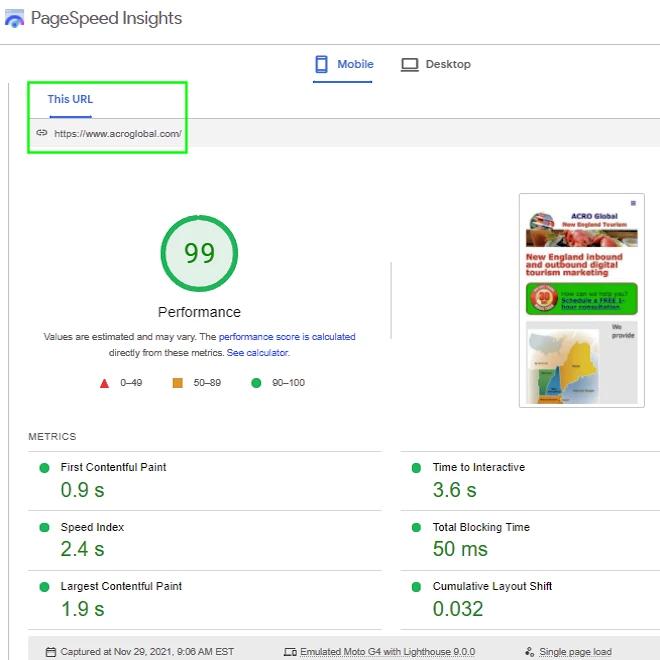
Google PageSpeed Insights Mobile Analysis of our ACROGlobal.com site
following Technical SEO analysis and on-page improvements
![]() Ready to start making more money now? Most Google Search Marketing campaigns need an investment of a few hundred to a few thousand dollars a month, unconditionally guaranteed to satisfy you. Go here to tell me a bit about your business objectives and Book a FREE Online Marketing Audit!
Ready to start making more money now? Most Google Search Marketing campaigns need an investment of a few hundred to a few thousand dollars a month, unconditionally guaranteed to satisfy you. Go here to tell me a bit about your business objectives and Book a FREE Online Marketing Audit!
FREE Download: Xenu's Link Sleuth
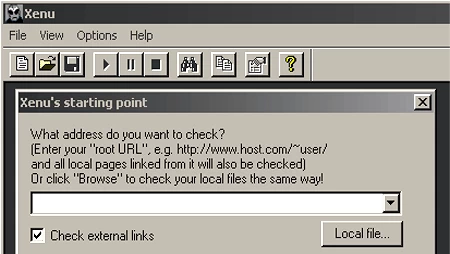 Xenu's Link Sleuth is a slick piece of Windows SEO software that with just a click can find, list and export to Excel a site's inbound and outbound links; broken links; page Titles, filenames and weights; image file sizes, META Description tags; and more. Run Link Sleuth on your site and I guarantee you'll find things that you didn't know need fixing.
Xenu's Link Sleuth is a slick piece of Windows SEO software that with just a click can find, list and export to Excel a site's inbound and outbound links; broken links; page Titles, filenames and weights; image file sizes, META Description tags; and more. Run Link Sleuth on your site and I guarantee you'll find things that you didn't know need fixing.
SEO Resources
Search Engine Journal Beginner's Guide to SEO
Some of My Blog Posts About SEO
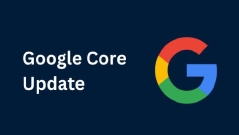
What to do if your Google rankings were adversely affected by a core update
Review and implement Google's guidance on building high-quality sites.

SEO for AI User Agents
Because AI agents don't render JavaScript, render critical content server-side.
 Google Page Experience Ranking now applies to desktop as well as mobile
Google Page Experience Ranking now applies to desktop as well as mobile
That means: You must have passing scores on Core Web Vitals, HTTPS not HTTP, no intrusive interstitials.

Google MUM has the potential to be a game-changer in search and SEO
MUM is multilingual (75 languages) and multi-modal (both text and images) and has 1000X the question-answering power of BERT.

To assess content quality, Google doesn't just look at text [VIDEO]
John Mueller: "[I]t's not the case that we would look at just purely the text...we really want to look at the website overall."

New research finds a one-second reduction in page load time lifts conversion 5.7% on mobile, 3.3% on desktop
58% of bounces are from pages that take longer than 4 seconds to load.
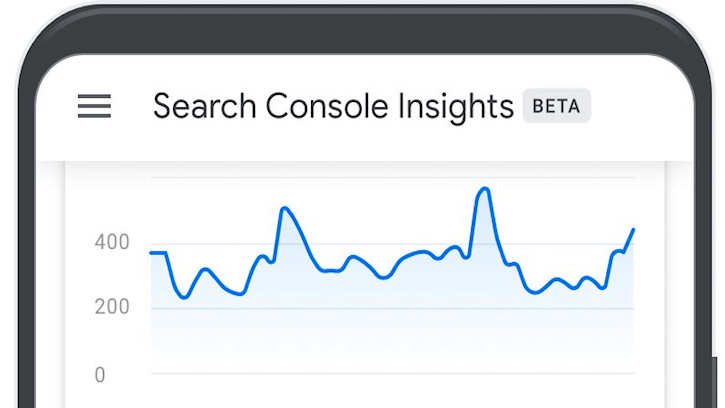
Google introduces Search Console Insights (BETA)
New tool is intended to help content creators and publishers understand what resonates with their audiences.
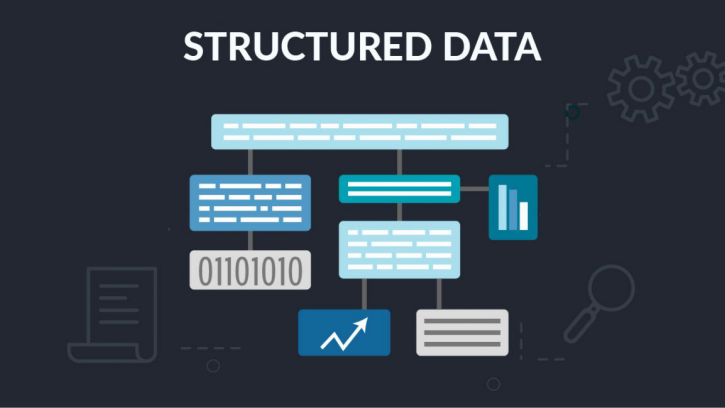
More comprehensive Schema.org markup validator to replace Google Structured Data Testing Tool
The new Schema.org validator is intended to be a ‘general-purpose’ tool you can use to debug many more structured data types than those supported by Google.

Google wants to see at least some content ‘above the fold’
“A part of your page should be visible when a user goes there - not just images, and without scrolling.”
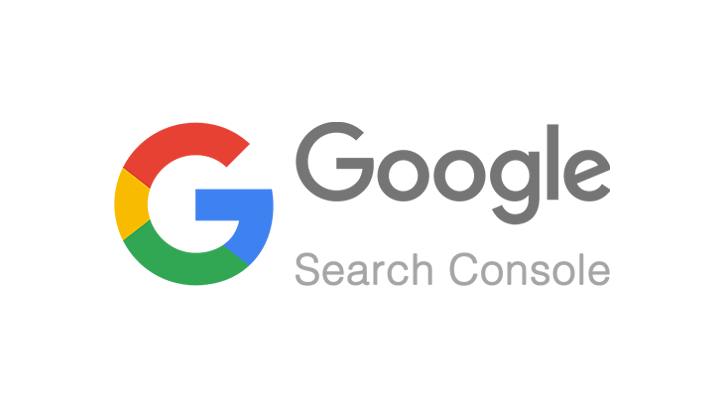
How to use the Google Search Console Performance Report
If you're managing a website, you need to be using Google Search Console reports.
Questions About SEO Answered
Q: Why should I use nofollow tags?
A: Use the nofollow tag to tell Google that the linked page is one that you don't endorse and don't want to be associated with your site. But you just linked to because the linked content somehow improves your users' experience.
Q: Does clicking links in Google Search affect a website's authority or ranking?
A: Two things that can negatively affect a website's authority or ranking are (1) low clickthrough rate (many more impressions than clicks) and (2) high bounce rate (large proportion of users reaching a landing page immediately click away off the site).
Q: How can we find and hire an SEO specialist or company to improve our website's search engine rankings?
A: Ask local business owners you know and trust if they're using an SEO consultant to whom they would be comfortable referring you. If no results from that, try doing a Google search for “seo consultant near me” - but be aware that the majority of SEOs that come up in that search will likely NOT be near you at all, but rather will be big full-service digital marketing companies in NYC or LA or elsewhere.
Q: How can you determine your Google search rank and does it fluctuate over time?
A: There is no “absolute” Google organic search rank for any web domain or URL. Results of each individual user query are colored by that user's search history and location, and the phrasing of the query. And yes, all else being equal, results will vary over time because of the aging of your content and the actions of competitors.
Q: Is page speed or mobile friendliness more important for ranking in Google?
A: Page speed is inherent in mobile-friendliness, so the 2 are inseparable. But because in July Google stopped indexing pages that can't be crawled by the mobile Googlebot agent, mobile-friendliness (whatever that is, exactly) is essential.
Q: How do I get Google ranking info for all pages of my site?
A: Google Search Console can show you for various time spans (last 7 days, all time, etc.) for each page its average position in SERPs. In the Performance report, turn on Average Position data (click on this above the graph) and click on Pages below the graph. Report will give you impressions, clicks and average position for each page with non-zero impressions.
Q: What are the steps in making my robots.txt crawlable?
A: For robots.txt to be useful in helping search engines find their way around your site, really all you have to do is put it at the root of your web server - where the default page is, the page that opens in browsers at “mydomain(dot)com”.
For robots.txt then to work as intended, in the simplest case add these lines of code:
Sitemap: https://www.mydomain(dot)com/sitemap.xml
User-agent: *
Disallow:
The “sitemap” line of code tells search engines where your xml sitemap is. You need to create this - there are free and paid online tools - and upload it to the server root.
The user-agent line says your robots.txt file applies to all crawlers (using the * wildcard).
The disallow line - with nothing after the colon - means “disallow none” - that is, no crawlers are disallowed.
Be sure to substitute your own domain for “mydomain”.
Q: How do I choose the best keywords for my geographical area since Search Console, Google Maps, and Wix all say different things?
A: It's difficult to get good local keyword data from any of the keyword tools, especially for a relatively small area. Texas might be doable, Rhode Island probably not. But even if you make every effort to hide your location from Google - incognito browser, etc. - Google still knows where you are. So the highest-ranking Google organic search returns - and top sponsored listings - for your type of business (with no geographic modifier) will usually produce what Google thinks are the most relevant local pages. You can then find out from the TITLE, META DESCRIPTION and H1 tags on these pages the keywords for which they've been optimized. And you can use one of the free online word-counting tools on the full text of these pages as well, to see what words/phrases appear most often.
Q: Why does an answer rank high on Google Search results but not show up when searching directly on the site?
A: I'm going to assume that by “searching directly” you mean via a search function that's installed on the site. If that's the case, the likely reason is that Google has a very much larger database of search history than does the onsite search function, and that users doing a similar query don't bounce from that page when sent there by Google.
Q: What is the process for checking the ranking of a website on Google compared to other websites with similar content?
A: Rankings are associated with queries, or “keywords.” You could just do a Google search on your query of interest and scroll through the results until you find that website. But that ranking is specific to you, because Google knows your physical location and search history. I get estimates of the “universal” relative ranking of websites/URLs for specific queries by using the SEMRUSH keyword tool - which is not free but is better than others I've tried. (I don't get commissions from SEMRUSH.)
Q: Can creating too many links at once result in a penalty from Google for our site?
A: If you mean backlinks: yes, because it will look to Google like you have bought these links - especially if they are of low quality or not relevant to your content.
Q: Google webmaster is not indexing my pages at all, and not even crawling, I don't have any penalty and I have only low competition keywords, I have more than 1k pages, it is been 20 days after I submit my sitemap?
A: I get 403 (forbidden) error from the URL of your home page. That probably means your web server is not configured correctly, or some necessary permission is lacking. Contact your hosting company.
Q: What is the significance of an XML sitemap for SEO? How can one create an error-free XML sitemap for submission to Google Webmaster Tools and Bing Webmaster Tools?
A: A good XML sitemap helps search engine agents crawl and index the important pages of your website quickly and accurately. Using a Google search, you should be able to find numerous free and paid XML sitemap creation tools online. Learn to use the various settings these kinds of tools offer, particularly the one that excludes unimportant pages.
Q: What is the meaning of the average position in the Google search console?
A: In Search Console reports, “average position” makes the most sense if you view it in the context of Performance/Queries or Performance/Pages. Those reports will show you, respectively:
For a specific user query, the average position in which an impression of one of your pages was made available; or
For a specific page, the average position in which an impression of that page was made available.
In either case, impressions are averaged over whatever timespan you've specified.
Q: How does Google determine the text to display as the "meta description" for a website in search engine results pages (SERP)?
A: In organic search returns, Google will usually display the first 150 or so characters of the META DESCRIPTION tag you have put on the page - unless it looks to them like that doesn't accurately represent the content of the page, in which case they might use the H1 tag or part of the first sentence of copy, or something else altogether. So write good META DESCRIPTION tags to avoid your search returns being created by someone at Google.
Q: Is it true that Google no longer considers meta keywords? If this is the case, why do some people still include them when they do not impact search engine rankings?
A: Although some other search engines may consider the META KEYWORDS tag, Google has not since 2009. But in my opinion the main reason not to use this tag is that it reveals to competitors the keywords for which you're trying to optimize pages.
Q: What is the recommended frequency for checking for broken links on a website to avoid SEO penalties from Google?
A: An occasional broken link won't bother Google all that much. But link checking is fast and easy with a free tool like Xenu Link Sleuth (search on that) so we check at least once a week.
Q: If content is not available on the homepage, can it affect ranking?
A: If you mean that home page has no content at all - the ultimate form of “thin content” - yes, that will adversely affect Google ranking. Google wants pages to have content that's of value to users. No content = no value.
Q: How do header tags (H1-H6) affect SEO?
A: Done correctly, H1 (etc.) tags help Google understand what your pages are about, and what copy in them is most important. Anything that can do that is advantageous SEO-wise.
Q: What happens if a webpage does not have a title tag or meta description? Will Google still show a description in the search results?
A: Yes, if it crawls and indexes the page at all, Google will create a description using the H1 tag, the first several words of text, or whatever else it may be able to find in the page. Always provide a TITLE and DESCRIPTION so that you have some control over the clicks your search result will draw.
Q: Does using HTTPS instead of HTTP on a website improve its SEO ranking on search engines like Google? If so, to what extent does it impact the ranking?
A: Google has been saying since at least September 2022 that it is aiming for 100% encryption of web pages and that accordingly, its “page experience signals” - used in ranking - include serving pages by HTTPS. So yes, in general you should expect HTTPS pages to rank somewhat better than HTTP pages - but it's difficult to isolate the impact of this one factor. Because it's easier to make pages HTTPS that it is to measure the effect: just do it.
Q: How important do you think on-page optimization is for a website to rank in Google?
A: The trick to doing on-page optimization and getting results at Google is to know which changes that you could make will move the needle ranking-wise, and concentrating on those.
Q: What is the process for changing the name of a website without affecting the domain name or SEO rankings?
A: I understand you to mean that you will be keeping the existing domain name (like “bobs.com”) but changing the TITLE and some other tags on the home page - and elsewhere - from “Bob's Store” to “Bob's Place” or something like that. Is that correct? If so, zero loss of organic search rank is going to be difficult to achieve while at the same time optimizing pages for the new site name. If page filenames and paths (URLs) will be changing, you can take care of that with redirects. But changes to content will affect rankings, and you can't fix that with redirects. Could you accomplish what you're trying to do with a subdomain or subdirectory? That would make maintaining rankings a lot easier.
Q: Can you explain the process of creating redirects for old URLs to new ones using Google Webmaster Tools?
A: Creating redirects should be done at your web server. Google Search Console (ex-Webmaster Tools) has a “Change of Address” tool but that only works for redirecting one domain or subdomain to another.
Q: How do I optimize my website's images to improve search engine rankings?
A: Based on a review of your site: Use modern file formats like webp that have much smaller file sizes so load faster. Use descriptive file names. Use descriptive ALTs. Put image dimensions in IMG tags so pages render faster. Place images in pages near related text so images have synergies with the rest of your content, for potentially better ranking. Make images links to further information. Avoid stock images wherever possible.
Q: How do I fix my website showing up high on Google but no clicks or sales for a seasonal winter product?
A: If your only product is something like ice skates or down jackets, you should expect demand to be very seasonal. Ski areas are attempting to raise off-season demand by introducing a related summer seasonal product: mountain biking. Is there a summer product that's a logical fit with your winter product - rollerblades, rain jackets?
Q: Is Google still the only Search Engine that matters when it comes to SEO?
A: Yes. With 90+% share of all searches in both North America and Europe, and with its ranking algorithm changing on a daily basis, Google is the only search engine worth spending time optimizing for. And as a by-product, any optimization done for Google also works well for any other general search engine.
Q: Can Google ban a website from ever showing on their search engine?
A: Yes. Most famously, in 2006 Google banned BMW Deutschland for cloaking. The site showed Google a keyword-stuffed page of text, while showing users photo car ads.
Q: Is Google search engine still upgrading?
A: Yes, on a daily, hourly or minute-by-minute basis.
Q: Does Google penalize sites that use more than one H1 tag per page for SEO?
A: No - but if you have multiple H1's the fix is easy, why take chances?
Q: How does Google determine a website has new content and thereby update search results?
A: You can influence this by referring in your robots.txt file to an XML sitemap in which you have specified an update frequency (daily, weekly, etc.) telling Google how often your site changes. Absent that, google will by trial and error establish a re-crawl frequency for your site. What Google finds on the latest crawl replaces earlier data. Search results will reflect the most recent crawl, but not necessarily instantaneously.
Q: What do you do if your content doesn't get crawled regularly by Google?
A: Start with the basics: create an XML sitemap that specifies your change frequency, link to the sitemap from your robots.txt file, take ownership of your site in Search Console and submit your sitemap for crawling.
Q: Does Google index mobile versions of a website in addition to standard format websites?
A: Short answer is “yes” but there's more to it than that. Currently, Google's primary crawler for indexing is the smartphone version of the Googlebot user agent. Since 1 July 2019, NEW sites are crawled ONLY with the smartphone user agent. Older sites that don't index easily using the smartphone version of Googlebot may continue to be crawled for some period of time with the desktop Googlebot. But the handwriting is on the wall: your site needs to be smartphone-Googlebot-friendly - right now.
Q: To effectively track my website with Google analytics, do I have to add their script on every pages that I create or can I just leave it on the index page only?
A: GA code must be on every page on which you want GA data. A relatively easy way to accomplish that is to find some piece of HTML code that appears consistently in the HEAD section of every page and use an HTML editor with search/replace function to replace globally that existing line of code with [the same line of code] + [your GA code].
Q: Would submitting my websites to directories help Google ranking?
A: Being listed in high-quality directories should help get you valuable traffic. Best bets are usually directories of local businesses, and industry-specific directories. Worst bets are directories that will list anyone in the world for money, or for reciprocal links. Example: A company calling itself “The Ultimate Directory Submission Service” (search for it on Google) will list you on “the top 491 free directories” for $0.20 a pop. Don't waste you time and money on deals like that.
Q: If I'm someone who wants to rank his blogs at will, will it be possible for me to achieve that if I know all 250 or more factors that Google search codes are about?
A: Along with knowing what all the ranking factors are, you'd have to be able to CONTROL them unilaterally from your end in order to rank your blogs “at will” - and that's going to be difficult because of (1) off-page factors that you can't control (like the actions of competitors) and (2) Google's ongoing (secret) tweaks to their ranking algorithm.
Q: How do you make your Google mobile search results more clickable?
A: Run Google's Mobile Friendliness Test on your home page. Google will tell you what needs fixing and how to do it. Implement all the recommendations and when Google is happy with your home page, repeat for your other important pages. Repeat until you get all the clicks you want.
Q: How do I get more visitors from Google for free to my local business website?
A: Create the best possible Google Business Profile, and keep it updated. Google is constantly adding features to its products, and GBP is no exception. Post photos. Encourage customers to leave reviews. Make sure your map pin is located correctly. Monitor GBP insights and improve your listing accordingly. On your website, cover all the SEO basics: TITLE and Description tags, no broken links, mobile friendliness, fast page loading. Doing all those things will, over time, attract high-quality links, which Google likes. Don't buy or exchange links, which Google DOESN'T like.
Q: Is there any public information available on how Google's algorithms work?
A: Speculation yes, “information” no - at least none that I would trust.
Q: How does Google generate the short descriptions below searches?
A: Usually from the META Description tag in the code at the head of the page.
Example:
If a site has a META Description tag like ‘Expert digital tourism advertising and marketing | Boston and Maine - customized research based campaigns’
Google will likely use part or all of ‘Expert digital tourism advertising and marketing | Boston and Maine - customized research based campaigns’ in the SERP.
If the page has no META Description tag (bad idea) or one that Google doesn't think is descriptive of the content, Google will pick/choose from available content - maybe the H1 tag or something in B tags.
Q: How many times does Google Spider need to visit a new page before it decides to rank it in the results?
A: Remember there's a distinction between indexing and ranking. The Googlebot is a dumb creature, just finds what's there and reports back. Ranking happens on a search-by-search basis. An unindexed page won't ever appear in a Google SERP, but the fact of indexing doesn't guarantee anything in the way of ranking.
Q: In the Google Search Console, what is the difference between an error and valid with warnings for schema markup? Also, does a warning prevent the content from being indexed?
A: Basic difference is that a structured-data warning should affect neither indexing nor ranking - not necessarily true of errors.
Q: Does Google consider no-follow links for search rankings?
A: Google has stopped ignoring nofollow links altogether, and now considers “nofollow” to be a clue as to the value of the link. Also Google now encourages the addition of “sponsored” or “ugc” attributes to nofollow links to make it easier for AI to understand the reason for the nofollow. Short answer: sometimes (maybe).
Q: Can you trust someone who claims the ability to predict Google ranking algorithms?
A: No, absolutely not. Anyone with the ability to do that would have too much money to be spending time trying to sell you SEO or whatever.
Q: Have the recent Google updates put sites that sell links out of business or are there still naive people who purchase them?
A: Unfortunately, Google has been slack in penalizing the use of paid backlinks. By doing a Google search on “buy links” you can see that the link-selling industry continues to be alive and well. Right now from that search, on Page 1 I'm seeing 7 paid Google Ads selling links along with a full slate of organic listings.
Q: What is Google optimization?
A: If your question is of a general nature - like “how do I optimize for Google search”: you begin by studying Google's policies and recommendations - all fully laid out in great detail at Google - then learn to use the various Google tools like Keyword Planner, PageSpeed Insights and Lighthouse. Create and test your website using those tools, follow all Google's recommendations for improvement. Repeat until you have the customers, leads and sales you want. Or, alternatively, hire a Google search pro to do the optimizing - faster immediately, and cheaper in the long run.
Q: Which backlinks do more harm than good to a website's search engine rankings?
A: Backlinks you pay for. Backlinks with reciprocal linking. Links from sites with content unrelated to yours.
Q: There are some pages that I have deleted from my website, but are still showing up in Google search. What will be better for seo, remove the page or redirect the page?
A: A 301 (permanent) redirect will be instant-on and will prevent links from Google and whoever else may be linking to that page from going to 404 "File Not Found" page (always a bad user experience). Then at your leisure you can find any existing links from external sites and ask webmasters to switch to a relevant existing URL.
Q: What is the least expensive Google keyword?
A: The least expensive keywords are those that never match a search query.
Q: Do SEO companies really help? Is it worth it?
A: SEO done well helps most businesses that are selling something for which people search online (and there are few exceptions to that today). But not all SEO companies are created equal. Avoid any that promise specific results like “page 1 of Google in 30 days” etc. - if you get an offer like that, ask ’page 1 on what keywords?” and be prepared for waffling. Extensive experience and specialization in your industry or a related group of industries are both useful qualifications for a company doing SEO. Also, to do SEO well requires a certain minimum threshold of up-front spend that's pretty much independent of the size of the client's business. So the minimum investment in effective SEO for a 3-room B&B might be about the same as that for a 100-room hotel, so may be out of reach for the smaller business. Google Ads is a useful alternative in that situation.
Q: What can SEO services do that WordPress plugins like Yoast can't?
A: Yoast is OK for basic on-page optimization but it doesn't know what's going on in your competitive space. And anyone doing SEO professionally will find that out, track, and adjust optimization accordingly.
Q: What do we need to set up Google Analytics on our site?
A: You need a Google account from which to create a Google Analytics tag, FTP (or otherwise) access to the website so you can download/upload HTML files, an HTML editor or other means to put the GA tags onto the pages.
Q: Should we look beyond Google for our SEO strategy and optimize for other search engines?
A: I once for several months tried optimizing for Bing alongside optimizations for Google, and found (1) it was a distraction, Google was enough to deal with without Bing, and (2) pages optimized for Google performed, on average, as well or better than those optimized for Bing. So once again, I optimize for Google only - which after all has 90%+ search share across the Western world vs. around 3% for Bing.
Search Engine Optimization (SEO) - Resources
Google Webmaster Central Blog
Updates on crawling, indexing and ranking - direct from Google
Search Engine Journal
SEO news, analysis, insights and guides
Search Engine Land
SEO tips, tactics, and strategies from industry experts
Backlinko
Actionable SEO advice for higher rankings and more traffic
SEM Post
New Google features being tested, and comprehensive analyses of algorithm updates
![]() Ready to start making more money now? Most Google Search Engine Optimization campaigns need an investment of a few hundred to a few thousand dollars a month, unconditionally guaranteed to satisfy you. Go here to tell me a bit about your business objectives and Get a Quote!
Ready to start making more money now? Most Google Search Engine Optimization campaigns need an investment of a few hundred to a few thousand dollars a month, unconditionally guaranteed to satisfy you. Go here to tell me a bit about your business objectives and Get a Quote!



